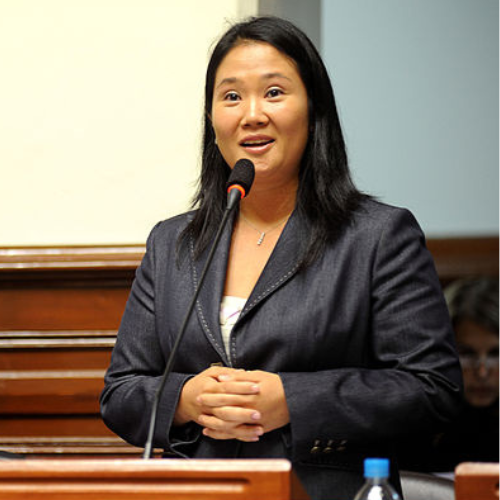Keiko Fujimori, a towering figure in Peruvian politics, appeared in a Lima courtroom to face charges of money laundering. The trial, anticipated to span several years, promises to be one of the most significant political proceedings in Peru’s recent history.
Background on Keiko Fujimori
Keiko Fujimori is no stranger to the political spotlight. She has been a presidential candidate three times, narrowly missing victory on each occasion, and has led the largest congressional faction in the country. Her political influence is further amplified by her lineage; she is the daughter of former President Alberto Fujimori. Alberto Fujimori’s presidency was marred by human rights violations, for which he was imprisoned, though he has since been pardoned and remains an active political figure.
The Charges and Allegations
The accusations against Keiko Fujimori are severe. Prosecutors allege that she led a criminal enterprise that laundered approximately $17 million to finance her presidential campaigns in 2011 and 2016. The funds allegedly came from notable contributors, including the Brazilian conglomerate Odebrecht and the Peruvian financial services company Credicorp. While Keiko has acknowledged receiving campaign contributions, she vehemently denies any wrongdoing, asserting that her actions were within legal bounds.
The scandal is not isolated, as Odebrecht has been at the center of numerous corruption cases across Latin America. The company has admitted to paying out hundreds of millions of dollars in bribes to secure public works contracts in several countries, making this trial part of a much larger narrative of corruption in the region.
A Lengthy and Complex Trial
The trial is expected to be a protracted affair, with Keiko Fujimori’s lawyer, Giulliana Loza, estimating it could last up to two years. The proceedings will involve over 5,000 exhibits and 1,300 witnesses called by the prosecution. Lead prosecutor Jose Domingo Perez, a central figure in Peru’s anti-corruption efforts, arrived at the court wearing a bullet-proof vest, highlighting the high stakes and potentially dangerous nature of the case.
This trial is not only significant due to the charges but also because of its sheer scale and complexity. The vast number of exhibits and witnesses indicate the extensive preparation by the prosecution, aiming to build an airtight case against Fujimori. Each piece of evidence and every testimony will be crucial in unraveling the alleged criminal network and understanding the flow of illicit funds.
The Broader Anti-Corruption Crusade
Keiko Fujimori’s trial is part of a broader anti-corruption initiative in Peru, which has been significantly influenced by the revelations of Odebrecht’s widespread corruption. The Brazilian conglomerate has been implicated in illegal campaign financing across Latin America, including in Peru, where at least four former presidents are alleged to have received illicit funds from Odebrecht. This trial, therefore, is not just about Keiko Fujimori but represents a larger effort to address and eradicate political corruption in the country.
The Odebrecht scandal has exposed the deep-seated corruption within Peru’s political system, leading to a nationwide reckoning. The investigations and subsequent trials are seen as a necessary step towards restoring public trust and ensuring that political leaders are held accountable for their actions.
Potential Consequences for Keiko Fujimori
Prosecutors are seeking a sentence of up to 30 years in prison for Keiko Fujimori. She has already experienced the harsh realities of legal battles, having spent time in pretrial detention between 2018 and 2020. A conviction could severely impact her political career, particularly her anticipated fourth presidential run in the 2026 elections. Despite the looming legal challenges, Keiko remains a resilient figure, continuously asserting her innocence and rallying her political base.
Her supporters argue that the charges are politically motivated, aimed at derailing her career and diminishing her influence. This perspective highlights the polarized nature of Peruvian politics, where Fujimori’s followers see her as a victim of an unjust system, while her detractors view her as emblematic of the corruption they wish to eliminate.
The Fujimori Family’s Continued Political Influence
The Fujimori name continues to hold significant sway in Peruvian politics. Alberto Fujimori, despite his controversial past, is expected to play a more active role in the upcoming political cycle. There are even discussions among party members about him possibly being on the presidential ticket or running for the newly created senate. This dynamic adds another layer of intrigue to Keiko’s trial, as the family’s political fortunes are closely intertwined.
The potential involvement of Alberto Fujimori in the next election cycle demonstrates the enduring loyalty of his political base and the complex legacy he has left behind. His involvement could either bolster Keiko’s position or further complicate her legal battles, depending on public and political reactions.


